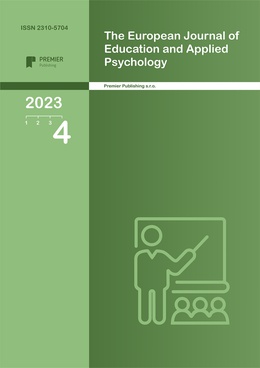Psychological-pedagogical requirements of foreign language teaching to students in technical areas.
Authors
Mukarama Katayeva

Share
Annotation
This article analyzes and makes recommendations for using mobile technologies for educational purposes in higher education, the methodology of teaching a foreign language, researchers' ideas about distance education, and the importance of mobile technology. The psychological and pedagogical conditions for using mobile technologies in teaching foreign languages, Motivation is a great way to engage students to study on mobile devices—the types of Motivation which are vital to use during classes. There are internal and external, positive and negative motivations that make learning exciting or satisfying the basic psychological needs of a person—mobile application, which students studied during a term in Namangan Engineering Construction Institute. The author gave the result of the research in Table 1a. In conclusion, Motivation is essential for the strategic success and implementation of the educational system. Teacher motivation is vital for several reasons. It is necessary for teacher creativity achievement and motivates teachers.
Keywords
Authors
Mukarama Katayeva

Share
References:
Andreyev, A.A. and Soldatkin, V.I. (1999) Distant Learning, Essense, Technology, Organization. MESI Publishing House, Moscow, 196.
Augustyniak, R., Ables, A., Guilford, P., Lujan, H., Cortright, R., & DiCarlo, S. (2016). Intrinsic motivation: an overlooked component for student success.. Advances in physiology education, 40 4, 465-466 . https://doi.org/10.1152/ADVAN.00072.2016.
Amin, A. K., Degeng, N. S., Setyosari, P., & Djatmika, E. T. (2021). The Effectiveness of Mobile Blended Problem Based Learning on Mathematical Problem Solving. International Journal of Interactive Mobile Technologies, 15(1). https://doi.org/10.3991/IJIM.V15I01.17437
Chen, J. F., Warden, C. A., & Chang, H.-T. (2005). Motivators That Do Not Motivate: The Case of Chinese EFL Learners and the Influence of Culture on Motivation. TESOL Quarterly, 39(4). https://doi.org/10.2307/3588524
Cho, M. H., & Castañeda, D. A. (2019). Motivational and affective engagement in learning Spanish with a mobile application. System, 81. https://doi.org/10.1016/j.system.2019.01.008
Cho, Y., & Perry, J. (2012). Intrinsic Motivation and Employee Attitudes. Review of Public Personnel Administration, 32, 382 - 406. https://doi.org/10.1177/0734371X11421495.
Chwo, G. S. M., Marek, M. W., & Wu, W. C. V. (2018). Meta-analysis of MALL research and design. In System (Vol. 74). https://doi.org/10.1016/j.system.2018.02.009
Crookes, G., & Schmidt, R. W. (1991). Motivation: Reopening the Research Agenda. Language Learning, 41(4). https://doi.org/10.1111/j.1467-1770.1991.tb00690.x
Evdokimova Marina Germanovna (2014). Virtual communities are a reality. Crede Experto: transport, society, education, language, (3), 296-303.(Евдокимова Марина Германовна (2014). Виртуальные сообщества - это реальность. Crede Experto: транспорт, общество, образование, язык, (3), 296-303.)
Hawamdeh, M., & Soykan, E. (2021). Systematic analysis of effectiveness of using mobile technologies (Mt) in teaching and learning foreign language. Online Journal of Communication and Media Technologies, 11(4). https://doi.org/10.30935/OJCMT/11256
Hussain, S., & Javed, T. (2019). Determination of Motivational Behavior by Implementation of Theory of Planned Behavior: A Study on Teachers of Higher Education Sectors of Punjab. International Journal of Academic Research in Business and Social Sciences, 9(3). https://doi.org/10.6007/ijarbss/v9-i3/5792
Kılıç, M. E., Kılıç, M. Y., & Akan, D. (2021). Motivation in the classroom. Participatory Educational Research, 8(2). https://doi.org/10.17275/per.21.28.8.2
Klimova, B. (2023). Mobile application for foreign language learning by cognitively unimpaired seniors. Procedia Computer Science, 218. https://doi.org/10.1016/j.procs.2023.01.055
Lai, Y., Saab, N., & Admiraal, W. (2022). University students’ use of mobile technology in self-directed language learning: Using the integrative model of behavior prediction. Computers and Education, 179. https://doi.org/10.1016/j.compedu.2021.104413
Lamb, M., Csizér, K., Henry, A., & Ryan, S. (2020). The palgrave handbook of motivation for language learning. In The Palgrave Handbook of Motivation for Language Learning. https://doi.org/10.1007/978-3-030-28380-3
Liu, C. L., & Lai, C. L. (2023). An exploration of instructional behaviors of a teacher in a mobile learning context. Teaching and Teacher Education, 121. https://doi.org/10.1016/j.tate.2022.103954
Lu, Y., & Xiong, T. (2023). The attitudes of high school students and teachers toward mobile apps for learning English: A Q methodology study. Social Sciences and Humanities Open, 8(1). https://doi.org/10.1016/j.ssaho.2023.100555
Mihelič, K., & Culiberg, B. (2018). Reaping the Fruits of Another’s Labor: The Role of Moral Meaningfulness, Mindfulness, and Motivation in Social Loafing. Journal of Business Ethics, 1-15. https://doi.org/10.1007/S10551-018-3933-Z.
Muhammed, A. A. (2014). The Impact of Mobiles on Language Learning on the Part of English Foreign Language (EFL) University Students. Procedia - Social and Behavioral Sciences, 136. https://doi.org/10.1016/j.sbspro.2014.05.297
Polakova, P., & Klimova, B. (2022). Vocabulary Mobile Learning Application in Blended English Language Learning. Frontiers in Psychology, 13. https://doi.org/10.3389/fpsyg.2022.869055
Ramírez-Donoso, L., Pérez-Sanagustín, M., Neyem, A., Alario-Hoyos, C., Hilliger, I., & Rojos, F. (2023). Fostering the use of online learning resources: results of using a mobile collaboration tool based on gamification in a blended course. Interactive Learning Environments, 31(3). https://doi.org/10.1080/10494820.2020.1855202
Sanda, L., & Klimova, B. (2021). Educational mobile applications for learning English as a second language by Czech seniors. Procedia Computer Science, 192. https://doi.org/10.1016/j.procs.2021.08.190
Yousaf, A., Yang, H., & Sanders, K. (2015). Effects of intrinsic and extrinsic motivation on task and contextual performance of Pakistani professionals. Journal of Managerial Psychology, 30, 133-150. https://doi.org/10.1108/JMP-09-2012-0277.
Yunusalievna, E. M.; Maxmudovna, K. M (2022). Theoretical Foundations of Using the Possibilities of Mobile Learning in the Educational Process. Web of science- Jundishapur Journal of Microbiology DOI: 10.17762/SFS.V10I2S.1584


